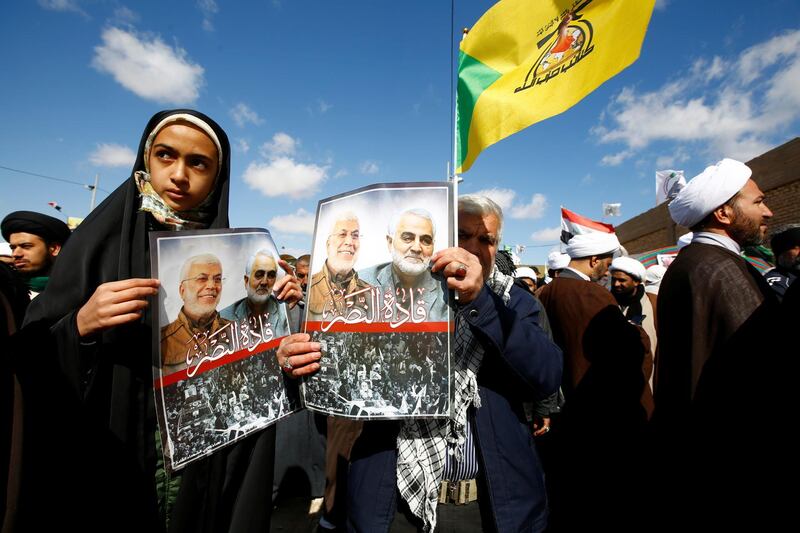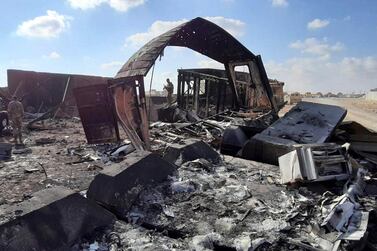Iraqi officials held a memorial service on Tuesday to mark 40 days since the killing of top Iranian general Qassem Suleimani and senior militia chief Abu Mahdi Al Muhandis.
The two were killed in a US strike outside Baghdad's International Airport on January 3, which Iraq said was in breach of its sovereignty.
Al Muhandis was the founder of Kataib Hezbollah, a powerful Iraqi militia, and deputy head of the Hashed Al Shaabi, a group of paramilitary forces.
Faleh Al Fayyadh, Iraq's National Security Adviser, attended the traditional Middle East service, as did the country's military chief of staff and interior minister.
"The great crime committed near Baghdad airport against the commanders of victory was a crime against humanity, against Iraq, against our sovereignty and against the defence of our children," Mr Fayyadh told those gathered.
"The blood of these martyrs, in my opinion, will re-establish this Hashed. May we be a thorn in the eye of anyone wishing to deprive Iraq of its sovereignty."
US-Iranian tensions increased after the killing of the two officials.
Suleimani commanded the Quds Force, the foreign operations arm of Iran's Islamic Republican Guard Corps, and Tehran's point man in Iraq.
Al Muhandis was a close ally of Tehran, working with Suleimani to broker deals among Iraq's fragmented political class.
Suleimani’s death will not solve any of Iraq’s security issues, said Sarkwat Al Shams, an Iraqi Member of Parliament.
"I was against his intervention but targeting him on Iraqi soil risked our unity as a country and revived sectarian politics," Mr Al Shams told The National.
“I believe we need to be serious that his death will have an impact on Iran’s Islamic Revolutionary Guard Corps, but for Iraq we should think about preventing any such incidents from recurring,” Mr Shams said.
US President Donald Trump authorised the strike on the two-car convoy outside Baghdad airport, calling the two leaders an "imminent threat" to the US.
Iraqi officials have repeatedly said they do not want to be caught in the middle of tensions between Iran and the US.
Iraq's Parliament voted last month to call for the withdrawal of US and foreign forces from the country.
There are more than 5,000 US troops stationed in Iraq, whose main missions are to battle ISIS and train the Iraqi military.
What has happened in the past 40 days in Iraq?
Iran retaliated on January 8 by launching more than a dozen missiles at two Iraqi military bases that housed US troops.
American officials said the attack caused traumatic brain injuries to nearly 109 US troops, despite originally stating none had been hurt.
Washington blamed Iran-backed paramilitary groups for the attacks but there has never been a claim of responsibility.
Several rockets struck in the heavily fortified Green Zone in late January.
On January 20, three Katyusha rockets hit the Green Zone, which houses government buildings, foreign embassies and US service members.







